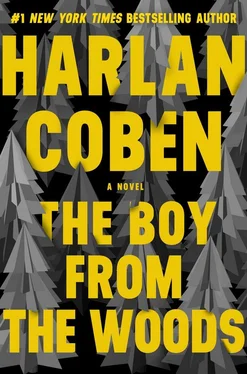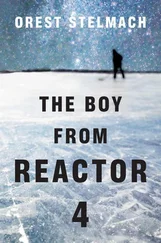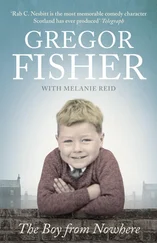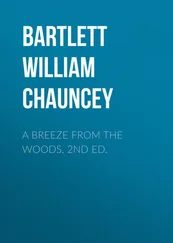“In short, yes. But there’s more to it.”
“Such as?”
“They were out that night.”
“Who?”
“Christopher Anson and Rusty Eggers. That took a while to track down. These interns — they were all kids from pretty wealthy families, so their names weren’t in the released report.”
“In a case this high profile?”
“Even more reason. ‘We will only cooperate if we’re assured our precious child’s name will not be sullied.’ They struck confidentiality deals before they’d testify. It turns out that the prosecutor didn’t need them for court. The knife discovery was enough. But anyway, a bartender at a local hangout called the Lockwood saw a whole group of the male interns that night. Look, it took a while. We had our best people on this. Most of the interns wouldn’t talk — heck, it’s been over thirty years — but from what we understand, Rusty Eggers and Christopher Anson didn’t get along. Both of them saw themselves as alphas in this group of interns. They were constantly competing. According to the bartender, they had words that night. One of their buddies had to separate them.”
“Rusty and the murder victim?”
“Yes.”
“Do you know who separated them?”
“Oh, you’ll like this. We showed the bartender that intern photo from the steps of the Capitol. Guess who he picked out?”
Wilde saw it now. “Dash Maynard.”
“Interesting, right?”
“So after Dash separates the two of them, what happened?”
“From what we can piece together, Christopher Anson storms out. He’s first to leave. Then later — no one can say if it’s half an hour, an hour — but the next person to leave was Rusty Eggers.”
“The police knew about this?”
Strauss nodded. “Their theory was, Anson left early to buy drugs. He’d done it before. Anson was something of the group’s... ‘dealer’ is too strong a word. Supplier maybe. So the police think Anson was drunk. He stumbled out to buy drugs in a bad neighborhood. He was well dressed — they were still in suits and ties from interning — and an easy target. Raymond Stark spots him or maybe Anson goes up to him to buy drugs. Either way, the white kid is an easy target. Raymond pulls the knife to rob him. Maybe Anson resists, maybe not.”
“Raymond Stark stabs him.”
“Right. But there are a lot of flaws in that theory.”
“For example?”
“Anson’s body was found in an alleyway. Our expert at the Truth Program examined the crime scene photos. He’s convinced the body was dumped there.”
“So Christopher Anson was killed somewhere else?”
“Our expert says yes.”
“Did Raymond’s lawyer bring it up at trial?”
Strauss shook his head. “He was pro bono. He couldn’t afford an expert.”
“And I assume the prosecution didn’t let anyone know?”
“There’s a chance their expert didn’t come to the same conclusion, but it’s probably classic ‘don’t ask, don’t tell’ prosecutorial misconduct. I don’t think it would have made a difference to the jury anyway. If it had come up, the prosecution would just say Raymond stabbed Anson somewhere else and dragged him into an alley, so no one would see.”
Wilde sat back. They took the new Tappan Zee Bridge across the Hudson back to New Jersey. A text came in from Hester:
Rola may have a lead on Naomi’s mother.
Wilde typed a reply:
Be back in half an hour.
Wilde said, “So you think Rusty Eggers killed Christopher Anson?”
“He was there that night,” Strauss began. “They exchanged angry words.”
“Meaningless.”
“On its own? Sure. But years later, Arnie Poplin hears Rusty admit killing someone to Dash Maynard and worrying about a tape.” Strauss took one hand off the wheel and held it toward Wilde. “And yeah, I know Arnie Poplin doesn’t pour all his cornflakes into one bowl, but think about Rusty Eggers’s behavior. He forces the Maynards to hire Gavin Chambers, maybe the best security man in the country, to guard them. Why?”
“Because there are indeed tapes,” Wilde said. “Like the one just released.”
“You think Eggers hired Chambers over that tape of him and Kandi Pate?”
“It could be.”
“It could be,” Strauss repeated, “but it’s not. Because there is one other thing we are leaving out.”
“What’s that?”
“Rusty Eggers is a stone-cold sociopath. I don’t know if he was born that way or that truck accident that killed his parents sent him off the rails, but it couldn’t be more obvious. He’s charming and ridiculously smart — but he’s seriously damaged. If you look through his past, there are too many people who got in his way who ended up dead.”
Wilde made a face. Strauss saw it out of the corner of his eye.
“What?”
“I’m not a huge fan of conspiracy theories,” Wilde said.
“It doesn’t matter,” Strauss said. “What matters is, if Rusty Eggers gets elected, millions of people may die. That is how it is with charismatic leaders like him. You’re a student of history. Don’t pretend you don’t see the danger.”
They drove some more.
“You sound like a guy with a lot of motive,” Wilde said.
“To do what?” Strauss smiled. “Kidnap two teenagers?”
Wilde turned to him.
“I told you I have sources,” Strauss said.
“So it seems.”
“And you’re missing my point, man. Someone really wants that tape. They’ll do pretty much anything, it seems, to get it. Including kidnapping kids. And their motives may not be altruistic. That’s what I’m trying to explain to you. If they get it before we do, they may destroy it. Or cover it up. And if that happens, Raymond Stark stays in jail for a crime he didn’t commit. That’s the micro level. On a macro level, maybe Rusty Eggers gets elected. You aren’t blind or as blasé as you pretend. You know what kind of destruction Rusty Eggers is capable of unleashing.”
Wilde thought about the tape. He thought about Rusty Eggers. But mostly he thought about Raymond Stark’s dream of being free. How soul-crushing it must be, on the cusp before you wake up, when you realize your release was just a dream, when you know the wisps of hope will soon be gone and you’ll be back in that cell.
“How did Raymond end up in that wheelchair?” Wilde asked.
Strauss was a big man with big gnarly hands. His grip on the wheel tightened. “In a sense, it’s part of the reason why Anson’s family will never accept that Raymond didn’t do it, even if we prove the knife was planted.”
Wilde waited.
“The Ansons wanted the death penalty. There was a quote in the news after the verdict from his father. A reporter asked Anson Senior if he felt that justice had been served. He said no. He said that Raymond Stark will get free housing and free clothes and three meals a day while his beautiful son’s dead body will be eaten by worms.”
Strauss took a shaking hand off the wheel and rubbed his chin. His eyes started blinking. “Raymond was in four months when some guys grabbed him in the shower. They laid him on his stomach on the tile. Two guys grabbed his arms and pulled. Two guys grabbed his legs and pulled. Like he was on a medieval rack. Another guy held Raymond’s face down, so that his nose was pressed against the ceramic. They held him and they pulled his limbs. Hard. And then another guy, a big guy, Raymond said, weighed over three hundred pounds, came over and said, ‘This is from the Anson family.’”
Strauss’s breathing was hitching now. Wilde sat next to him, almost afraid to move.
“The big guy is still standing. He straddles Raymond’s stretched-out body. Then he jumps up in the air, like he’s coming from the top rope at a wrestling match. That’s how Raymond described it. The other men pull his legs and arms even harder, totally taut, painful, and this big guy’s full weight slams into Raymond’s lower back like a sledgehammer. Raymond hears his spine snap, he said, like a strong wind whipping a dry branch off an old oak.”
Читать дальше












